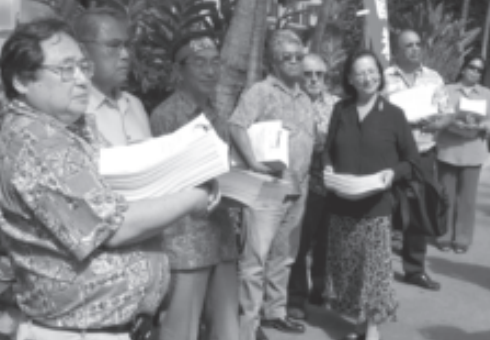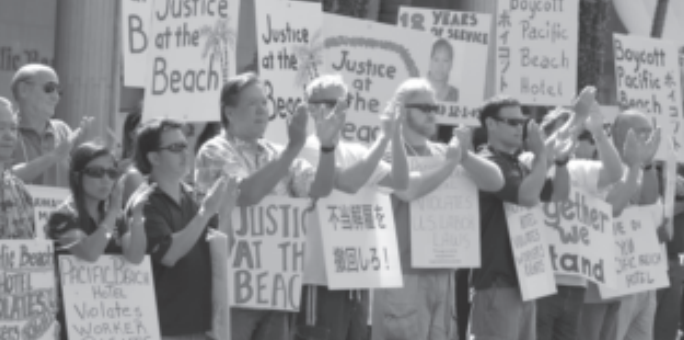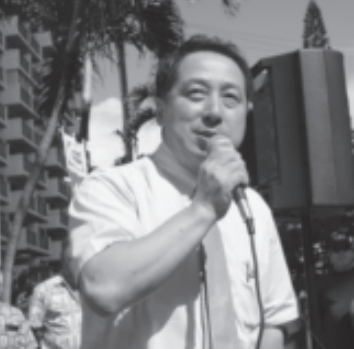
Guy Fujimura, Fred Galdones, Akinobu Itoh, Clayton Dela Cruz, Richard Baker, Jo Anne Trask, William Kennison, and Donna Domingo carry some of the 65,000 petitions.

Justice at the Beach includes many community and labor organizations.

Shigeru Wada, Regional Secretary of the International Transport Workers’ Federation, explains how the entire Japanese labor movement supports the struggle of the Pacific Beach Hotel workers.
Shigeru Wada explained that the Japanese are not boycotting Hawaii. “The Japanese love Hawaii but they also recognize the injustice at the Pacific Beach Hotel,” said Wada.
The Japanese unionist had expected to collect only a few thousand signatures but were pleasantly surprised when nearly 65,000 union members signed the petitions supporting the Pacific Beach Hotel (PBH) workers fight for justice.
The boycott is supported by the 6.8 million member Japanese Trade Union Confederation (RENGO). In a video statement, RENGO President Tsuyoshi Takagi called HTH management’s action “unacceptable” and called on the Japanese public and the Japan Association of Travel Agents to call on their associates to stop using the Pacific Beach Hotel (PBH) momentarily and to urge PBH management to reconsider their actions.
Contracts between Japan travel agencies and Hawaii hotels are for one year, and Takagi expects more travel agencies will cooperate when they learn about the labor dispute at the Pacific Beach Hotel.
President Takagi called on the workers of the hotel—“Do not be defeated by management! Please keep up the fight!”
Most of Japan’s largest travel agencies such as JTB, NTA, and Kinki Nippon are unionized by Service Rengo. Yutaka Kasahara, President of Service Rengo, called tourism the ultimate peacetime industry which depends on the touch in service by human hands. “As people who work for travel agencies, we are concerned whether we can confidently send guests to where such a labor-managaement dispute could arise, to a hotel that neglects its workers,” Kasahara said.
The videos can be seen on http:// supportpbhworkers.blogspot.com/.
NLRB starts trial of HTH / Pacific Beach Hotel
National Labor Relations Board agents began the presentation of their case against HTH Corporation as hearings before an NLRB administrative law judge began at the Federal Building on November 4, 2008.
Representatives from Outrigger Hotels gave sworn testimony which supported the ILWU’s charge that HTH had no intention to bargain in good faith with the union.
HTH hired Outrigger to manage the Pacific Beach Hotel beginning January 1, 2007. On August 2, 2007, Outrigger asked permission to agree to a contract with the ILWU. The next day, on August 3, 2007, HTH suddenly terminated the contract with Outrigger.
HTH resumed management of the hotel, refused to recognize the ILWU, and intensified discrimination and intimidation of employees who supported the union.
The hearings will continue on January 13-23, 2009, as evidence and testimony are presented on the 13 charges against HTH are heard by the administrative law judge.
Earlier, on October 21, 2008, the General Counsel of the NLRB rejected HTH’s appeals. The NLRB found no evidence that the ILWU engaged in any unlawful conduct in its demand for recognition which the hotel complained would cause the hotel to discriminate against bargaining unit employees.
The NLRB also found that the ILWU did not violate the law in calling for a boycott against both the Pacific Beach Hotel and the Pagoda Hotel and Restaurant.
Protecting your work opportunity in slow times
Work Opportunity is an important benefit protected under your union contract. The term refers to a full-time worker’s right to expect a normal schedule each week. When there is more or less work available, most ILWU contracts define who has the right to do this work.
Work opportunity is about preserving work that belongs to union members. Work opportunity is also about fairly distributing work among union members—who gets shorter hours when it’s slow and who gets more hours when it’s busy. Work opportunity has to be constantly enforced and this is best done with an informed and involved membership.
This article will cover some of the basic principles of work opportunity, and some of what we talk about may be different under your contract. You need to read the ILWU contract for your company to learn exactly how work opportunity is applied at your workplace.
In general, among workers who do the same job, full-time workers have preference for work opportunity over part-time workers. Part-time workers have preference for work opportunity over casual or on-call workers. This usually means that full-timers should work more hours than part-timers and casuals. There could be a violation of the contract if full-time workers are being sent home early while part-timers continue to work.
Workers covered by the union contract have preference over anyone not covered by the union contract, such as supervisors and outside contractors. There could be a violation of work opportunity if supervisors and employees not covered by the contract are doing our work. This could be taking hours away from a union member.
Among workers in the same job and status (full-time, part-time, or casual), most ILWU contracts give the senior worker preference for work opportunity. It is very different in longshore, where the low-hour person or gang has the preference for work opportunity.
Alert members
Work opportunity is one area where management will often do whatever it takes to get the job done, and they may do this in a way that violates the contract. For example, instead of calling a full-time worker, a supervisor may use a part-timer or supervisors may do some of the work themselves. This is one area where an alert membership can put a stop to violations of work opportunity. If you see supervisors or outsiders doing our work, report this to your unit officers or business agent. If you see full-time workers sent home early while part-timers continue to work, report this to the union.
Preserving our work
Don’t let supervisors take away our jobs. If it appears that supervisors and non-union employees are regularly doing our work, it may be because the company is not scheduling enough workers to do the job. Members should take notes when they see supervisors working and pass this information on to their union steward or unit officers. It is important to have a written record of how many hours supervisors work and what they do. The union can then take action and raise this issue with management.
Members need to watch for unfamiliar people on the job—these people could be a subcontractor doing work which could be done by our members. In several cases, after the union raised the issue, management realized that subcontracting saved a little money, but the company lost control over how the work was done and the quality of the job was poor. These companies found that using their regular workers resulted in a much better job.
All units should keep track of newly hired workers, welcome them into the union, and check if the new hires have signed the forms for union dues deduction. By doing this, units can discover if the company has hired temporary workers and are not covering them under the union contract. In one case, a company mistakenly classified certain workers as not covered by the union.
Make sure long-term vacancies are filled. Units should keep in touch with members who are off work because of workplace injuries or illness. If it is known that the injury or illness will last several months, then the union can push for a temporary transfer to fill the vacancy.
Some golf course units have increased their work opportunity by negotiating agreements with management where workers can get trained to do jobs in other departments. Those workers are then used to fill these jobs when people go on vacation or for long-term injuries.
At one hotel, housekeepers can get the training and opportunity to work banquets and special functions. The housekeepers have a chance to earn more money and the hotel has a larger pool of workers when there is a banquet function.
Whenever dealing with work opportunity grievances, unit officers should try to work out an understanding of how similar situations should be handled in the future. When an understanding is reached, members need to be informed about the details of that understanding by holding a membership meeting or printing a unit bulletin.
